Elemental Media Conference
October 16 — 18, 2024
CONFERENCE | FILM SCREENING | DURATIONAL PERFORMANCE
A three-day conference of panels, screenings, and performances exploring the force of the elemental in and beyond media studies.
Breadcrumb
Elemental Media Conference
October 16 — 18, 2024
CONFERENCE | FILM SCREENING | DURATIONAL PERFORMANCE
A three-day conference of panels, screenings, and performances exploring the force of the elemental in and beyond media studies.
An IGNITE Series Campus Project
Hosted by the Department of Modern Culture and Media’s Elemental Media Lab (EML)

Elemental Media Conference
October 16 — 18, 2024
Granoff Center for the Creative Arts
The 2024 Elemental Media Conference will bring together an interdisciplinary collective of scholars, artists, students, and community members to explore questions of the elemental in and beyond media studies. Over the course of three days, participants will engage in collaborative sessions taking the form of moderated conversations between leading scholars and practitioners, research presentations, keynote roundtables, film screenings, Samia Henni's exhibition Performing Colonial Toxicity, as well as the last-ever performance of artist Julie Tolentino’s HONEY and a featured lecture by Naomi Klein in conversation with Macarena Gómez-Barris and Bonnie Honig. This event develops out of a departmental initiative to bring questions of ecological and deep temporal inquiry to the study of media in line with turns in the field at large, such as media archaeology, media ecologies, bio-mediatics, the study of non and inhuman forms, and of technologies and techniques of power.
Also supported by the Malcolm S. Forbes Center for Culture and Media Studies and the Center for Environmental Humanities at Brown (CEHAB).
Schedule
4:00 PM — 4:45 PM
Guided walkthrough of Samia Henni’s exhibition Performing Colonial Toxicity
- Location: MCM Carriage House, 155 George Street, Providence, RI
5:00 PM
Welcome Remarks by Macarena Gómez-Barris
- Location: Martinos Auditorium, Granoff Center for the Creative Arts
5:20 PM
Elemental Film Screening programmed by Adel Ben Bella and Irene Rihuete-Varea
- Location: Martinos Auditorium, Granoff Center for the Creative Arts
- Atlantiques, Mati Diop, France/Senegal, 2009, 16 min.
- At(h)ome, Elisabeth Leuvrey, France/Algeria, 2013, 53 min.
- El nido del sol, Colectivo Los Ingrávidos, México, 2021, 5 min.
- Ancestral Clouds Ancestral Claims, Arjuna Neuman and Denise Ferreira da Silva, 2023, 49 min.
7:30 PM — 8:00 PM
Reception
- Location: Atrium Gallery, Granoff Center for the Creative Arts
- Wine, beer, non-alcoholic drinks
9:00 AM
Light Breakfast Reception
- Location: Atrium Gallery, Granoff Center for the Creative Arts
9:45 AM
Opening Remarks by Dean Zach Sng and Macarena Gómez-Barris
10:00 AM — 12:00 PM
Session 1: Toxicity, Forced Migration, and the Resistance of the Earth
- Location: Martinos Auditorium, Granoff Center for the Creative Arts
- Ariella Aïsha Azoulay: Panel Convenor & Moderator
- Presenters: Al-Wah’at (Ailo Ribas, Gabriella Demczuk, & Areej Ashhab), Samia Henni, Jumana Manna, Sherena Razek
12:00 PM — 1:00 PM
Lunch
- Location: Atrium Gallery, Granoff Center for the Creative Arts
1:00 PM — 3:00 PM
Session 2: Media Epistemology of Traces
- Location: Martinos Auditorium, Granoff Center for the Creative Arts
- Jinying Li: Panel Convenor & Moderator
- Presenters: Yuriko Furuhata, Julia Huggins, Susan Schuppli
3:30 PM — 4:45 PM
Session 3: Indigenous Poetics
- Location: Martinos Auditorium, Granoff Center for the Creative Arts
- Macarena Gómez-Barris: Panel Convenor & Moderator
- Presenters: Luis Cárcamo-Huechante, dg nanouk okpik
5:00 PM
Performance: Julie Tolentino, HONEY
- Location: Fishman Studio, Granoff Center for the Creative Arts
5:00 PM — 8:00 PM
Reception
- Location: Atrium Gallery, Granoff Center for the Creative Arts
- Drinks and substantial hors d’oeuvres
9:00 AM
Breakfast
- Location: Atrium Gallery, Granoff Center for the Creative Arts
- Coffee, tea, and light pastries
9:45 AM — 11:45 AM
Session 4: Media Ecologies In and Against the World
- Location: Martinos Auditorium, Granoff Center for the Creative Arts
- Rebecca Schneider: Panel Convenor & Moderator
- Presenters: Rizvana Bradley, Dana Luciano, Alberta Whittle
11:45 AM — 12:30 PM
Lunch
- Location: Atrium Gallery, Granoff Center for the Creative Arts
12:30 PM — 2:30 PM
Session 5: Ecologies of Anti/Blackness
- Location: Martinos Auditorium, Granoff Center for the Creative Arts
- Alexander Weheliye: Panel Convenor & Moderator
- Presenters: Kimberly Bain, Dixa Ramirez-D’Oleo, Kiyan Williams, JM Nimocks
3:30 PM — 5:30 PM
Featured Event: Naomi Klein in Conversation with Bonnie Honig and Macarena Gómez-Barris (Co-sponsor, Democracy Project)
- Location: Martinos Auditorium, Granoff Center for the Creative Arts
5:30 PM — 6:00 PM
Closing Reception (Organized by Democracy Project)
Presenters
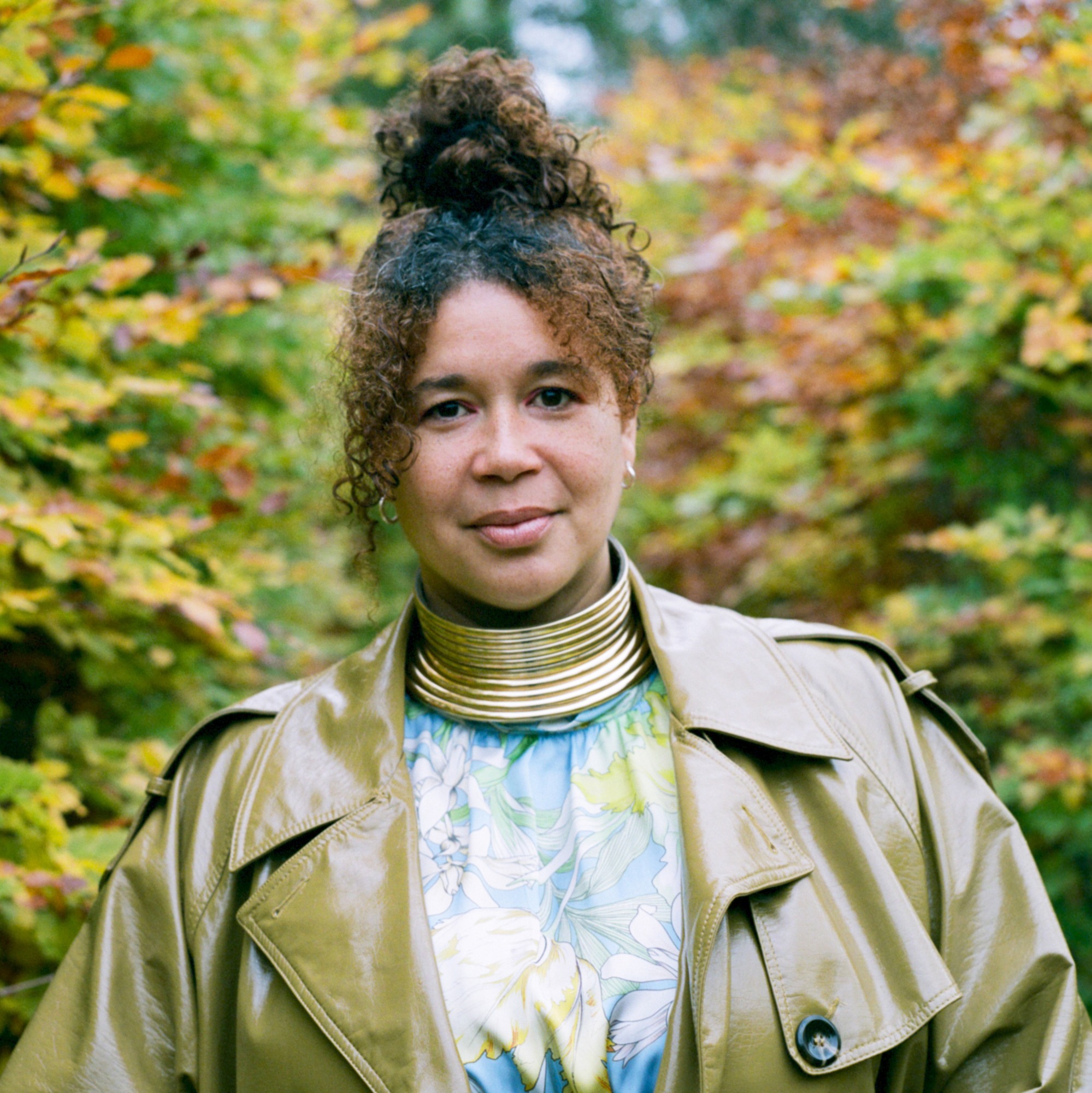 Alberta Whittle (b. 1980 Bridgetown, Barbados) lives and works in Glasgow. After studying Fine Art at Edinburgh College of Art, she completed a master’s degree at Glasgow School of Art in 2011. Alberta completed her PhD in 2024 at the University of Edinburgh and is currently a Research Associate at The University of Johannesburg in South Africa.
Alberta Whittle (b. 1980 Bridgetown, Barbados) lives and works in Glasgow. After studying Fine Art at Edinburgh College of Art, she completed a master’s degree at Glasgow School of Art in 2011. Alberta completed her PhD in 2024 at the University of Edinburgh and is currently a Research Associate at The University of Johannesburg in South Africa.
Her extensive range of exhibitions include solo presentations at Mount Stuart, Isle of Bute (2024), Institute of Contemporary Art, Philadelphia (2024, with Dominique White); Institute of Contemporary Art, Los Angeles (2023); Scottish National Gallery of Modern Art, Edinburgh (2023); Holburne Museum, Bath (2023); Scotland + Venice, 59th Venice Biennale (2022); University of Johannesburg Gallery, Johannesburg (2021); Jupiter Artland, Edinburgh (2021); Glasgow International (2021); Grand Union, Birmingham (2020); and Dundee Contemporary Arts (2019). Selected group exhibitions include Soulscapes, Dulwich Picture Gallery, London (2024); Black Atlantic: Power, People, Resistance, The Fitzwilliam Museum, Cambridge (2023); Soft and weak like water, 14th Gwangju Biennale, Gwangju (2023); British Art Show 9 (2021–2022); Moving Bodies, Moving Images, Whitechapel Gallery, London (2022); Black Melancholia, CCS Bard Hessel Museum of Art, Annandale-on-Hudson (2022); Sex Ecologies, Kunsthall Trondheim, Norway (2021); and Life between islands: Caribbean British Art 1950s – Now, Tate Britain, London (2021).
Alberta has received a Paul Hamlyn Foundation Award (2022), a Turner Bursary (2020), Frieze Artist Award (2020), a Henry Moore Foundation Artist Award (2020), and Margaret Tait Award (2018–19).
Her work is included in the permanent collections of the Advanced Research Centre, University of Glasgow; Arts Council Collection; Art Gallery of Ontario; The Contemporary Art Research Collection, Edinburgh College of Art; Glasgow Museums Collection; Government Art Collection; The McManus, Dundee;
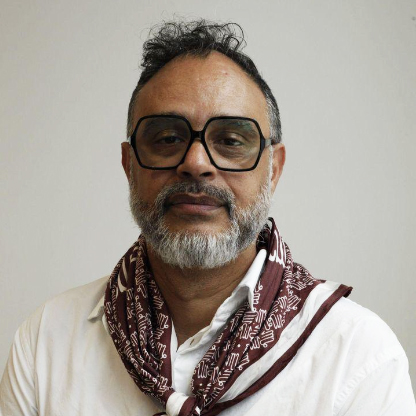 Alexander Ghedi Weheliye is Malcom S. Forbes Professor of Modern Culture and Media. He teaches and researches in the areas of critical theory, Black literature and culture, gender and sexuality studies, social technologies, and popular culture. He is the author of Phonographies: Grooves in Sonic Afro-Modernity (2005), which was awarded The Modern Language Association's William Sanders Scarborough Prize for Outstanding Scholarly Study of Black American Literature or Culture, Habeas Viscus: Racializing Assemblages, Biopolitics, and Black Feminist Theories of the Human (2014), and Feenin: R&B Music and the Materiality of BlackFem Voices and Technology (2023).
Alexander Ghedi Weheliye is Malcom S. Forbes Professor of Modern Culture and Media. He teaches and researches in the areas of critical theory, Black literature and culture, gender and sexuality studies, social technologies, and popular culture. He is the author of Phonographies: Grooves in Sonic Afro-Modernity (2005), which was awarded The Modern Language Association's William Sanders Scarborough Prize for Outstanding Scholarly Study of Black American Literature or Culture, Habeas Viscus: Racializing Assemblages, Biopolitics, and Black Feminist Theories of the Human (2014), and Feenin: R&B Music and the Materiality of BlackFem Voices and Technology (2023).
Currently, he is working on two projects. The first, Modernity Hesitant: The Civilizational Diagnostics of W.E.B. Du Bois and Walter Benjamin, tracks the different ways in which these thinkers imagine the marginal as central to the workings of modern civilization. The second, Schwarz-Sein: Black Life beyond the Human, which situates Blackness as an ungendered ontology of unbelonging. His work has been published in many journals, and the anthologies Black Europe and the African Diaspora, The Oxford Handbook of Mobile Music Studies, Wie Rassismus aus Wörtern spricht: (K)erben des Kolonialismus im Wissensarchiv deutsche Sprache, and re/visionen: Postkoloniale Perspektiven von People of Color auf Rassismus, Kulturpolitik und Widerstand in Deutschland.
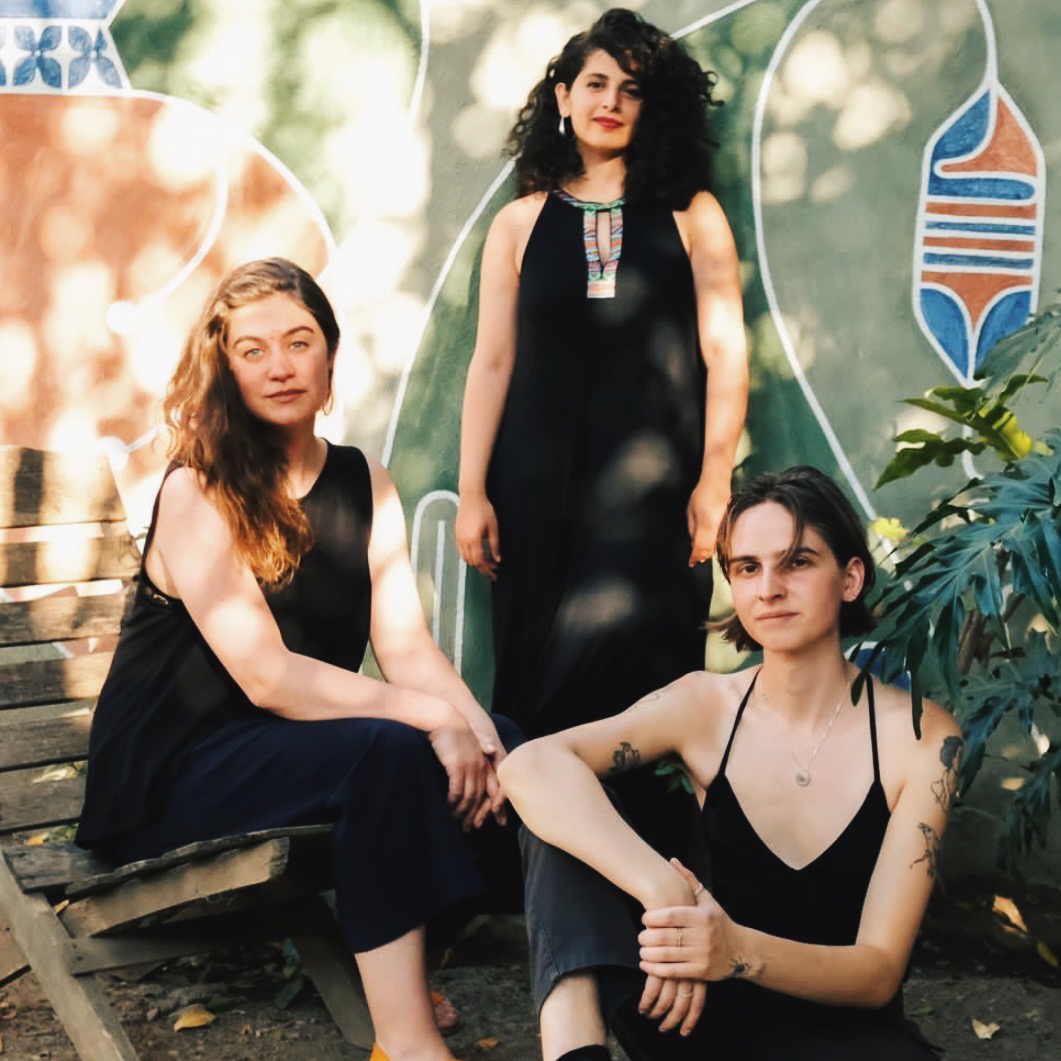 Al-Wah’at Collective - Formed by Ailo Ribas, Gabriella Demczuk and Areej Ashhab in 2022, Al-Wah’at is an artist research collective committed to growing communal practices in ecologies typically regarded as hostile and lifeless. Their work seeks to counter harmful anthropocentric and colonial narratives around arid lands and futures by engaging with a diversity of knowledges—be they local, folk wisdom, scientific, translocal, more-than-human—in order to create a more holistic understanding of these spaces, particularly in light of climate change. Their project Wild Hedges, started in 2023 at Sakiya: art|science|agriculture in Ein Qiniya, Palestine, as part of the Soil Futures residency program organised by Arts Catalyst and funded by the British Council, was awarded the COAL Art and Environment 2023 prize. The project studies and works with the ecological and socio-political complexities of the prickly pear cactus and the cochineal insect across multiple geographies, communities and temporalities.
Al-Wah’at Collective - Formed by Ailo Ribas, Gabriella Demczuk and Areej Ashhab in 2022, Al-Wah’at is an artist research collective committed to growing communal practices in ecologies typically regarded as hostile and lifeless. Their work seeks to counter harmful anthropocentric and colonial narratives around arid lands and futures by engaging with a diversity of knowledges—be they local, folk wisdom, scientific, translocal, more-than-human—in order to create a more holistic understanding of these spaces, particularly in light of climate change. Their project Wild Hedges, started in 2023 at Sakiya: art|science|agriculture in Ein Qiniya, Palestine, as part of the Soil Futures residency program organised by Arts Catalyst and funded by the British Council, was awarded the COAL Art and Environment 2023 prize. The project studies and works with the ecological and socio-political complexities of the prickly pear cactus and the cochineal insect across multiple geographies, communities and temporalities.
Ailo Ribas is a Catalan-English writer, researcher, community organiser, and gardener committed to untangling the relationship between language and the land through cultivating folk knowledge from the margins. She is an organiser of London Trans+ Pride, and a co-founder of Al-Wah'at, an artist-research collective committed to growing communal practices in ecologies typically regarded as hostile and lifeless; they are 2023 LINA fellows, winners of the COAL 2023 prize and 2025 Jan Van Eyck Academie residents. Her first book The Fast-growing Stinking Escaped Waste-loving Wall-breaching Self-cloning Other-than-natural No-man’s Tree, co-written with Areej Ashhab, will be published by the Sharjah Art Foundation in November 2024.
Areej Ashhab is a Palestinian artist, architect, and researcher based in Jerusalem. Her work navigates the landscapes of Palestine, cultivating decolonial community land practices and delving into the politics of material ecologies. She’s a co-founder of Al-Block collective, documenting lost narratives of the Palestinian landscape through collective walking and journaling. Ashhab has contributed to projects like Between Lime and Clay (2023-2024), The Absent Map (Riwaq Centre, 2021-2022), Souq Stories (Palestine, 2021), and Jerusalem Show IX (Al-Ma'mal Foundation, 2018). She has also taught at institutions such as the Royal College of Art, London, and the Arab American University, Ramallah.
She holds a masters degree from the Centre for Research Architecture.
Gabriella Demczuk is a Lebanese-American artist, journalist, and spatial researcher whose work focuses on the issues of political ecology, the proprietary modes of abstraction, and colonial/capitalist land practices. For a decade, she worked as a member of the White House press, photographing three presidential administrations, Washington politics, and stories across the U.S. related to immigration and environmental policy for The New York Times, TIME, National Geographic, and various other publications. Recently her political work has been exhibited at the Saatchi Gallery in London as part of the show America in Crisis and her salt prints of ghost forests were presented at Fotografiska in New York City as part of Maya Lin’s Ghost Forest installation at Madison Square Park. She is co-founder of Al-Wah’at, an artist-research collective committed to developing spatial, community, and ecological practices around arid lands and futures. Gabriella is an Associate Lecturer of Media Studies in the School of Architecture at the Royal College of Art. She holds a graduate degree with distinction from the Centre for Research Architecture at Goldsmiths, University of London and an undergraduate degree in Fine Arts and Journalism from The George Washington University in Washington, D.C.
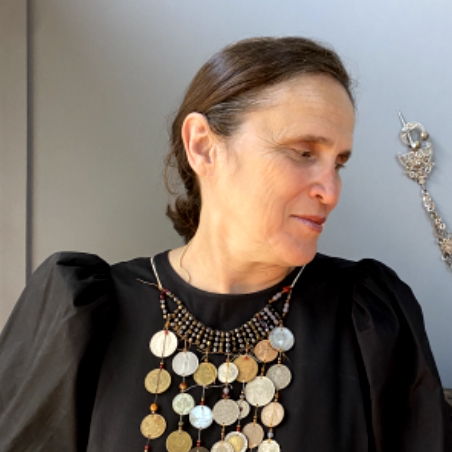 Ariella Aïsha Azoulay (born 1962), Professor of Modern Culture and Media and the Department of Comparative Literature, Brown University.
Ariella Aïsha Azoulay (born 1962), Professor of Modern Culture and Media and the Department of Comparative Literature, Brown University.
Her books include: Potential History – Unlearning Imperialism (Verso, 2019); Civil Imagination: The Political Ontology of Photography (Verso, 2012); The Civil Contract of Photography (Zone Books, 2008); Aïm Deüelle Lüski and Horizontal Photography, Leuven University Press and Cornell University Press, 2013; From Palestine to Israel: A Photographic Record of Destruction and State Formation, 1947-1950, (Pluto Press, 2011); co-author with Adi Ophir. The One State Condition: Occupation and Democracy between the Sea and the River. Stanford University Press, 2012.
Among her potential histories, archives and curatorial work were shown in different places: The Natural History of Rape (Berlin Binnale, 2022), Errata (Tapiès Foundation, 2019, HKW, Berlin, 2020), Enough! The Natural Violence of New World Order, (F/Stop photography festival, Leipzig, 2016), Act of State 1967-2007, (Centre Pompidou, 2016, Arquivo Municipal de Lisboa Fotografico, 2020); Enough! The Natural Violence of the New World Order (F/Stop festival, Leipzig, 2016); "The Natural History of Rape" (Pembroke Hall, Brown University, 2015); The Body Politic [in Really Useful Knowledge, curated by What, How & for Whom / WHW], Reina Sofia, Madrid; When The Body Politic Ceases To Be An Idea, Exhibition Room - Manifesta Journal Around Curatorial Practices No 16 Potential History (2012, Stuk / Artefact, Louven), Untaken Photographs (2010, Igor Zabel Award, The Moderna galerija, Lubliana; Zochrot, Tel Aviv), Architecture of Destruction (Zochrot, Tel Aviv), Everything Could Be Seen (Um El Fahem Gallery of Art).
Among her film essays: Un-documented: Undoing Imperial Plunder (2019); Civil Alliances, Palestine, 47-48 (2012); I Also Dwell Among Your Own People: Conversations with Azmi Bishara (2004) & The Food Chain (2004).
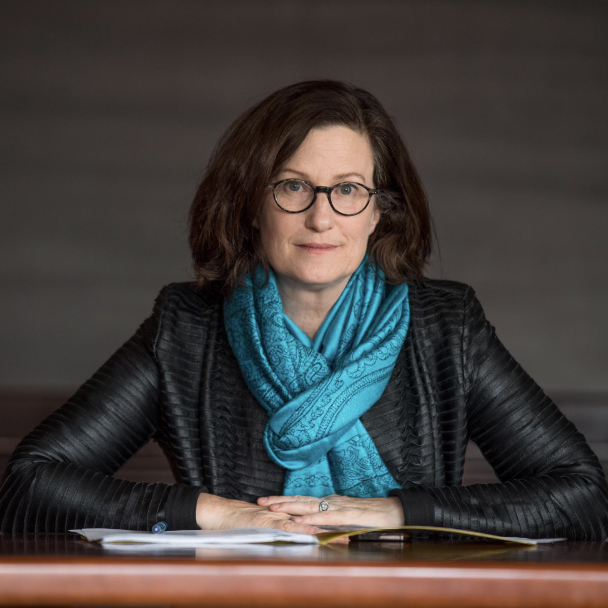 Bonnie Honig is Nancy Duke Lewis Professor of Modern Culture and Media (MCM) and Political Science at Brown University, and (by courtesy) Religious Studies (RS) and Theater and Performance Studies (TAPS). She is author of several books, including: Political Theory and the Displacement of Politics (Cornell, 1993, Scripps Prize for best first book, reissued in 30th annversary edition, Cornell, 2023), Democracy and the Foreigner (Princeton, 2001), Emergency Politics: Paradox, Law, Democracy (Princeton, 2009, David Easton Prize), Antigone, Interrupted (Cambridge University Press, 2013), Public Things: Democracy in Disrepair (Fordham, 2017), A Feminist Theory of Refusal (Harvard, 2021) and Shell Shocked: Feminist Criticism After Trump (Fordham, 2021: a collection of revised versions of her public writing since 2016).
Bonnie Honig is Nancy Duke Lewis Professor of Modern Culture and Media (MCM) and Political Science at Brown University, and (by courtesy) Religious Studies (RS) and Theater and Performance Studies (TAPS). She is author of several books, including: Political Theory and the Displacement of Politics (Cornell, 1993, Scripps Prize for best first book, reissued in 30th annversary edition, Cornell, 2023), Democracy and the Foreigner (Princeton, 2001), Emergency Politics: Paradox, Law, Democracy (Princeton, 2009, David Easton Prize), Antigone, Interrupted (Cambridge University Press, 2013), Public Things: Democracy in Disrepair (Fordham, 2017), A Feminist Theory of Refusal (Harvard, 2021) and Shell Shocked: Feminist Criticism After Trump (Fordham, 2021: a collection of revised versions of her public writing since 2016).
Honig has also edited or co-edited several collections, including Feminist Interpretations of Hannah Arendt (Penn State, 1995), the Oxford Handbook of Political Theory (Oxford, 2008), and Politics, Theory, and Film: Critical Encounters with Lars von Trier (Oxford, 2016). Her articles have appeared in a wide variety of journals, including Arethusa (Okin-Young Prize for best article in feminist theory), New Literary History, Political Theory, theory&event, Social Text, differences, American Political Science Review, Political Theology, and (fc, 2023) Cultural Critique.
Honig has been interviewed by The Nation and Polity in print and by several podcats, including the Cogut Institute's Meeting Street and Why We Argue.
In 2017-18 she served as the Inaugural Carl Cranor Phi Beta Kappa Scholar, and she is currently an affiliate of the Digital Democracy Group at Simon Fraser University and the American Bar Foundation in Chicago.
Dana Luciano is Professor of English and Women’s, Gender, and Sexuality Studies at Rutgers University. Her most recent monograph, How the Earth Feels: Geological Fantasy in the Nineteenth Century U.S. was published by Duke University Press in January 2024. She is a founding editor of Regeneration: Environment, Art, Culture, a new multimedia, open-access environmental humanities journal.
 dg nanouk Okpik is Inupiaq, Inuit from Alaska. Okpik graduated with honors in Creative Writing. She has received an American Book Award, May Sarton Award, Truman Capote Literary Trust, Windham Campbell Award. Okpik was a finalist for the Pulitzer Prize. Okpik resides in Santa Fe, New Mexico.
dg nanouk Okpik is Inupiaq, Inuit from Alaska. Okpik graduated with honors in Creative Writing. She has received an American Book Award, May Sarton Award, Truman Capote Literary Trust, Windham Campbell Award. Okpik was a finalist for the Pulitzer Prize. Okpik resides in Santa Fe, New Mexico.
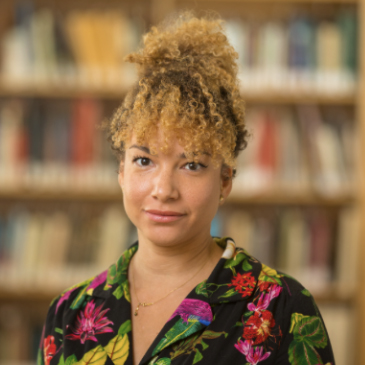 Dixa Ramírez-D’Oleo is Associate Professor in the English department. Her research and teaching focus on the literatures and histories of the extended Caribbean, especially the Dominican Republic and Haiti, as well as black critical theory and literary criticism. She received her A.B. from Brown University in Comparative Literature and her PhD from the University of California, San Diego.
Dixa Ramírez-D’Oleo is Associate Professor in the English department. Her research and teaching focus on the literatures and histories of the extended Caribbean, especially the Dominican Republic and Haiti, as well as black critical theory and literary criticism. She received her A.B. from Brown University in Comparative Literature and her PhD from the University of California, San Diego.
Her second book, This Will Not Be Generative (2023), was recently published by Cambridge University Press's Elements in Feminism and Contemporary Critical Theory series. Her first book, Colonial Phantoms: Belonging and Refusal in the Dominican Americas, from the Nineteenth Century to the Present (2018, NYU Press) received the 2019 Barbara Christian Literary Award from the Caribbean Studies Association and the 2019 Isis Duarte Book Prize, Haiti/Dominican Republic Section in the Latin American Studies Association. Two new books are forthcoming: Blackness and the Photographic Negative, with Duke University Press and a translation into Spanish of Colonial Phantoms, with Editorial Universitaria Bonó.
Her writing has been published in ASAP/Journal, Atlantic Studies, Avidly, The Black Scholar, Comparative Literature, Hyperallergic, Interventions, the Los Angeles Review of Books, Small Axe, and Social Text. She also serves on the Editorial Committee of Small Axe.
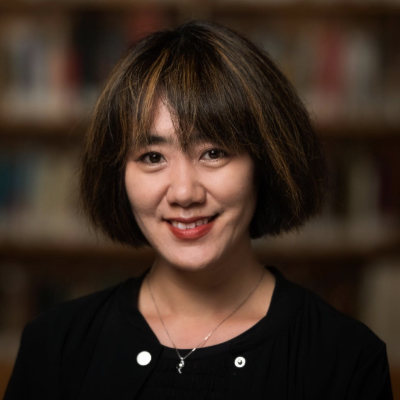
Jinying Li is Assistant Professor of Modern Culture and Media at Brown University. She focuses her teaching and research on media theory, animation, and digital culture in East Asia. Her essays on Asian cinema, animation, and digital media have been published in Film International, Mechademia, the International Journal of Communication, Journal of Chinese Cinemas, Asiascape, Asian Cinema, and Camera Obscura. She co-edited two special issues on Chinese animation for the Journal of Chinese Cinemas, and a special issue on regional platforms for Asiascape: Digital Asia. Her first book, Anime's Knowledge Cultures (University of Minnesota Press, 2024), explores the connection between the anime boom and global geekdom. She is currently completing her second book, Walled Media and Mediating Walls. Jinying is also a filmmaker and has worked on animations, feature films, and documentaries. Two documentary TV series that she produced were broadcasted nationwide in China through Shanghai Media Group (SMG). She is one of the co-writers of animated feature film Big Fish and Begonia (Dayu Haitang, 2016). She also produced an experimental VR documentary 47km (2017) in collaboration with Chinese director Zhang Mengqi at Beijing Film Academy.
 J.M. Nimocks (any pronouns) is a third-year PhD student in the Modern Culture and Media department at Brown University. They received their B.A. in Environmental Analysis at Pomona College and was a recipient of the Fulbright Research Fellowship - Brazil in 2019 through the University of Washington. While completing their Master’s in Social Work, J.M. was a participant of the Black Embodiments Studio, an incubator for arts writing primarily focused on the work black artists and scholars in the Pacific Northwest. J.M.’s ongoing dissertation project considers the intersections of visual histories of scientific thought post-Enlightenment, German idealism, new materialism, and the racialized body and performance through black critical thought. Outside of academia, J.M. is a performance artist and sex workers' rights activist.
J.M. Nimocks (any pronouns) is a third-year PhD student in the Modern Culture and Media department at Brown University. They received their B.A. in Environmental Analysis at Pomona College and was a recipient of the Fulbright Research Fellowship - Brazil in 2019 through the University of Washington. While completing their Master’s in Social Work, J.M. was a participant of the Black Embodiments Studio, an incubator for arts writing primarily focused on the work black artists and scholars in the Pacific Northwest. J.M.’s ongoing dissertation project considers the intersections of visual histories of scientific thought post-Enlightenment, German idealism, new materialism, and the racialized body and performance through black critical thought. Outside of academia, J.M. is a performance artist and sex workers' rights activist.
Julia Huggins is a Postdoctoral Associate with the Technology, Culture, and Society Initiative at Rice University. Her research centers environmental media, media theory, postcolonial and feminist science and technology studies, and critical legal studies. Her work has been supported by the Social Sciences and Humanities Research Council of Canada and Fulbright Canada, and her writing has appeared in Fata Morgana.
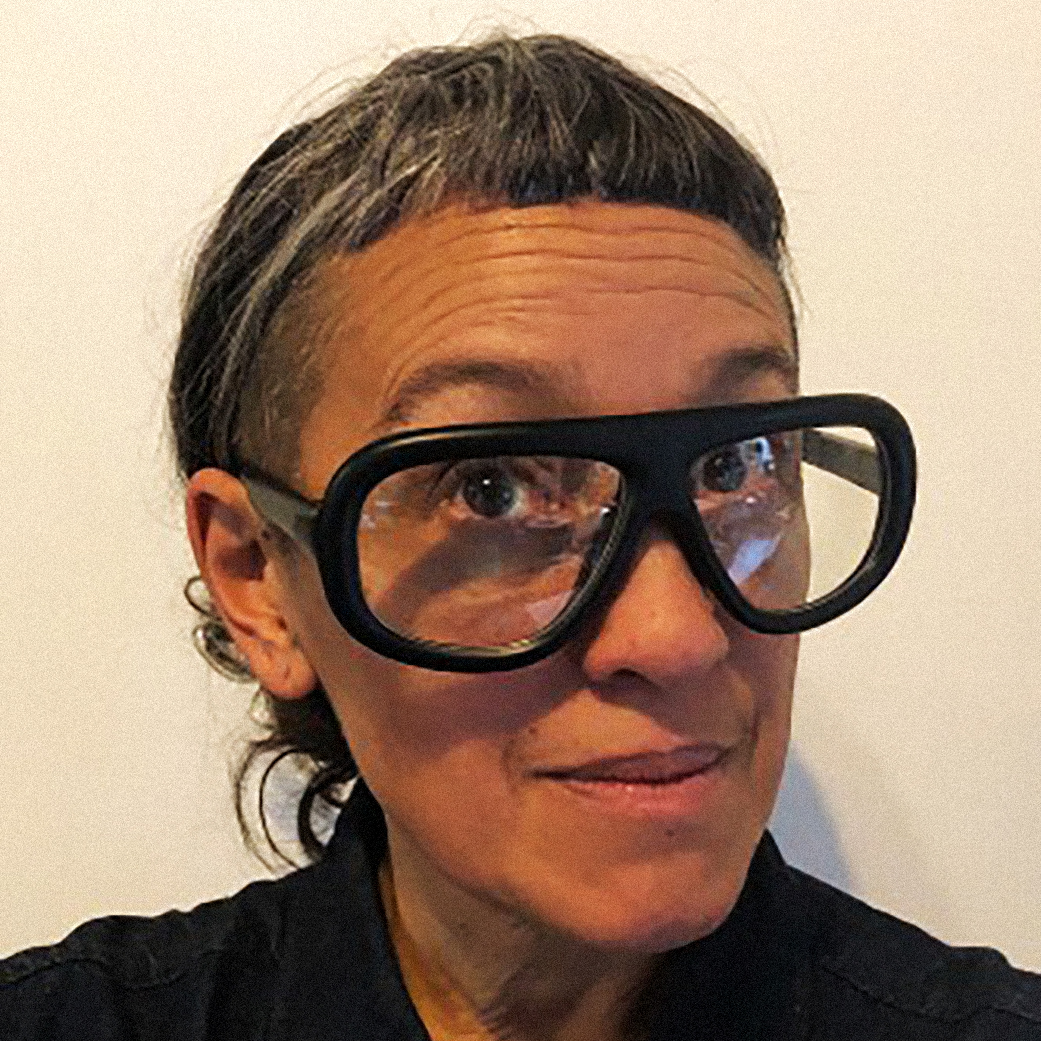 Julie Tolentino is a Filipinx-Salvadoran artist whose practice extends across durational performance, movement, installation, sculpture, video, and sound. Over the past three decades, she/they have created work occupying the interstitial spaces of relationality and memory, race and empire, sexuality and the archive. Her projects across media are drawn in intimate response to the rich learning spaces of activism, underground nightlife, loss, and caregiving. Most recently, her installation and performance-based projects HOLD TIGHT GENTLY and ECHO POSITION (created in collaboration with Ivy Kwan Arce) were featured in the 2022 Whitney Biennial. Her work has also been exhibited at Los Angeles Contemporary Exhibitions (LACE), The New Museum, Performance Space New York, The Kitchen, Performa ’05 and’13, Yerba Buena Center for the Arts, Aspen Art Museum, House of World Cultures/Berlin, Theaterworks Singapore, and the Thessaloniki Biennial, among many other venues.
Julie Tolentino is a Filipinx-Salvadoran artist whose practice extends across durational performance, movement, installation, sculpture, video, and sound. Over the past three decades, she/they have created work occupying the interstitial spaces of relationality and memory, race and empire, sexuality and the archive. Her projects across media are drawn in intimate response to the rich learning spaces of activism, underground nightlife, loss, and caregiving. Most recently, her installation and performance-based projects HOLD TIGHT GENTLY and ECHO POSITION (created in collaboration with Ivy Kwan Arce) were featured in the 2022 Whitney Biennial. Her work has also been exhibited at Los Angeles Contemporary Exhibitions (LACE), The New Museum, Performance Space New York, The Kitchen, Performa ’05 and’13, Yerba Buena Center for the Arts, Aspen Art Museum, House of World Cultures/Berlin, Theaterworks Singapore, and the Thessaloniki Biennial, among many other venues.
Collaboration has long been a cornerstone of Tolentino’s practice, which has encompassed projects developed with artists including Stosh Fila, Robert Crouch, Kia Labeija, Jonathan Berger, Ron Athey, and David Roussève, among others. A member of ACT-UP, Art Positive, and the House of Color Video Collective, Tolentino also founded and led the Clit Club, the legendary lesbian/queer/punk performance party that ran from 1990 to 2002. Their interdisciplinary curatorial and publication projects have included Movements in Blue with the What Would An HIV Doula Do? Collective; The Lesbian AIDS Project Women’s Safer Sex Handbook with Cynthia Madansky; and Coming to Power: 25 Years of Sexually X-Plicit Art By Women, a restaging of the pivotal 1993 exhibition originally curated by artist Ellen Cantor. Since 2006 she has been engaged in the creation and exhibition of The Sky Remains The Same, a lifelong project to “archive” works of durational and performance art by Tolentino’s friends, peers, and collaborators through reperformance and other strategies of embodiment.
Tolentino is a recipient of the Anonymous Was A Woman Award, a Queer | Art Sustained Achievement Award, Foundation for Contemporary Arts in Performance, a MacDowell Fellowship, as well as major support from Art Matters Foundation, and the Joyce Foundation Award. Since 2012, Tolentino has been the editor of the Provocations section of the performance studies journal TDR: The Drama Review. She holds an MFA in Experimental Choreography from the University of California at Riverside and is currently core faculty at the California Institute of the Arts (CalArts.)
She/They are represented by Commonwealth & Council Gallery in Los Angeles and Mexico City and resides between LA and Joshua Tree.
 Jumana Manna is a visual artist and filmmaker. Her work explores how power is articulated, focusing on the body, land and materiality in relation to colonial inheritances and histories of place. Through sculpture, filmmaking, and occasional writing, Manna deals with the paradoxes of preservation practices, particularly within the fields of architecture, agriculture and law. Her practice considers the tension between the modernist traditions of categorisation and conservation and the unruliness of ruination, life and its regeneration. Jumana was raised in Jerusalem and lives in Berlin.
Jumana Manna is a visual artist and filmmaker. Her work explores how power is articulated, focusing on the body, land and materiality in relation to colonial inheritances and histories of place. Through sculpture, filmmaking, and occasional writing, Manna deals with the paradoxes of preservation practices, particularly within the fields of architecture, agriculture and law. Her practice considers the tension between the modernist traditions of categorisation and conservation and the unruliness of ruination, life and its regeneration. Jumana was raised in Jerusalem and lives in Berlin.
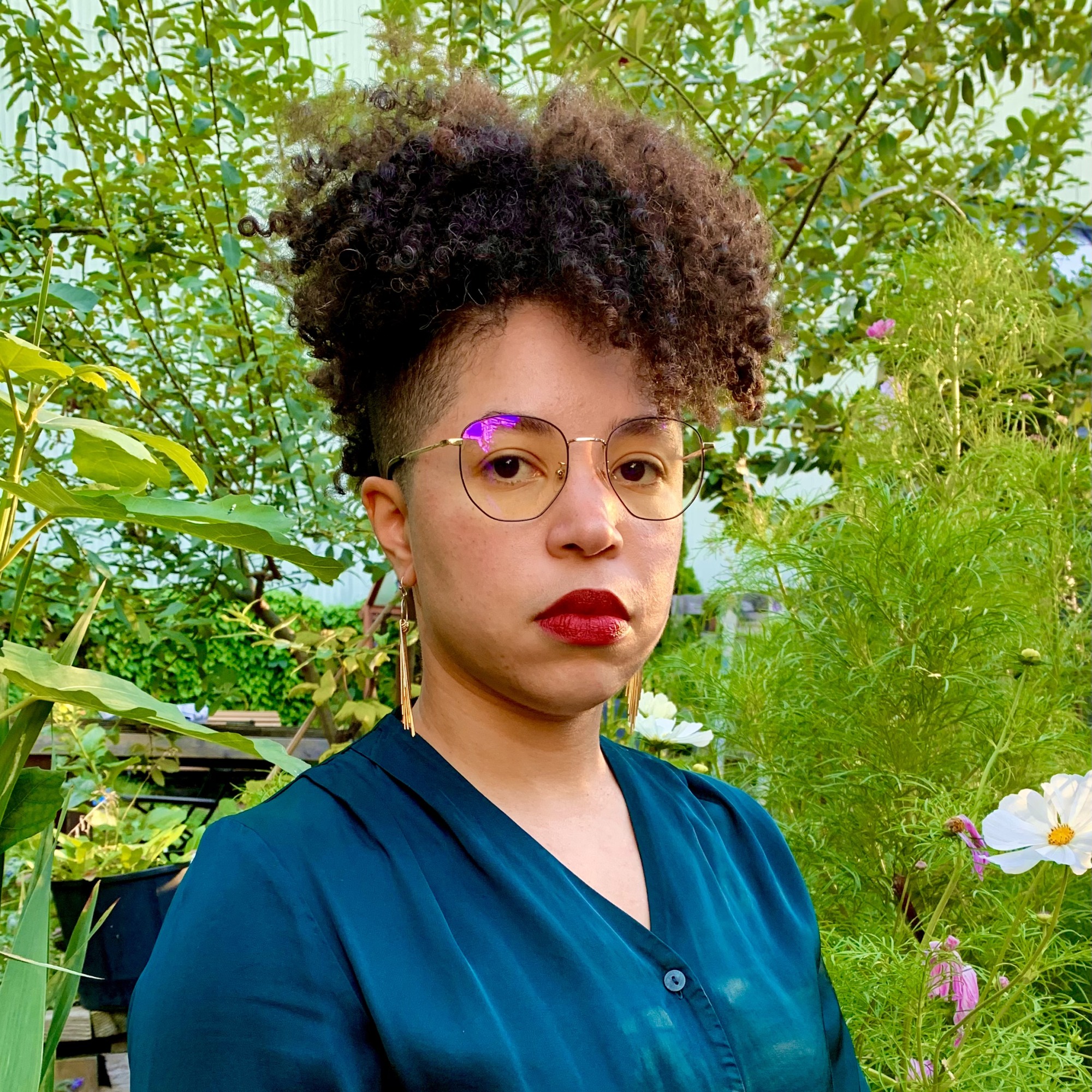 Kimberly Bain is an Assistant Professor in the Department of English Language and Literatures at the University of British Columbia—Vancouver. Her most pressing and urgent concerns have consolidated around questions of the history, theory, and philosophy of the African diaspora. She is currently at work on two scholarly monographs. The first, entitled On Black Breath, traces a genealogy of breathing and Blackness in the United States. Her second book, Black Alchemy: Dirt, Soil, and Other Dark Matter, turns to dirt for understanding how Blackness has shaped global considerations of the Anthropocene and refused the extractive relations of racial capitalism.
Kimberly Bain is an Assistant Professor in the Department of English Language and Literatures at the University of British Columbia—Vancouver. Her most pressing and urgent concerns have consolidated around questions of the history, theory, and philosophy of the African diaspora. She is currently at work on two scholarly monographs. The first, entitled On Black Breath, traces a genealogy of breathing and Blackness in the United States. Her second book, Black Alchemy: Dirt, Soil, and Other Dark Matter, turns to dirt for understanding how Blackness has shaped global considerations of the Anthropocene and refused the extractive relations of racial capitalism.
Kiyan Williams is an artist based in New York City. Known for their immersive sculptural installations that transform monumental forms into earthen ruins, their practice subverts dominant narratives of history and power, blurs the line between the permanent and the ephemeral, and imagines speculative futures on the other side of empire in which structures of power are remade and reclaimed by an entanglement of fugitive plant, insect, animal, human, and non-human life.
Their work has been exhibited across the country and internationally. Williams was included in the 2024 Whitney Biennial, Even Better Than the Real Thing. Williams earned a BA with honors from Stanford University and an MFA in Visual Art from Columbia University. They currently have work on view at Art Omi in Ghent New York and at Paula Cooper Gallery in NYC.
Luis E. Cárcamo-Huechante is an internationally well-known Mapuche Williche scholar and is a member of the faculty at The University of Texas at Austin. He has been recently elected as President of the Native American and Indigenous Studies Association (NAISA) for the 2025-2026 term. Between 2016 and 2024, he also served as a director of the Program in Native American and Indigenous Studies (NAIS) at UT Austin. Professor Cárcamo-Huechante is a founding member of the Comunidad de Historia Mapuche, which is a collective of Mapuche researchers/activists based in southern Chile. In 2007, he published his first book, Tramas del mercado: imaginación económica, cultura pública y literatura en el Chile de fines del siglo veinte (Santiago: Editorial Cuarto Propio). Professor Cárcamo-Huechante has just completed his second book, titled Indigenous Interference: Acoustic Colonialism and Mapuche Response, which is scheduled to be published by Duke University Press in 2025.
 Macarena Gómez-Barris is a writer and scholar with a focus on the decolonial environmental humanities, authoritarianism and extractivism, queer Latinx epistemes, media environments, racial ecologies, cultural theory and artistic practice.
Macarena Gómez-Barris is a writer and scholar with a focus on the decolonial environmental humanities, authoritarianism and extractivism, queer Latinx epistemes, media environments, racial ecologies, cultural theory and artistic practice.
She is author of four books including, The Extractive Zone: Social Ecologies and Decolonial Perspectives (Duke University Press, 2017) that examines five scenes of ruinous extractive capitalism. Beyond the Pink Tide: Art and Political Undercurrents in the Américas (UC Press 2018), a text of critical hope about the role of submerged art and solidarities in troubled times. She is also author of Where Memory Dwells: Culture and State Violence in Chile (2009), and co-editor with Herman Gray of Towards a Sociology of a Trace (2010). She is series editor with Diana Taylor of Dissident Acts at Duke University Press.
Her forthcoming book is At the Sea’s Edge (Duke University Press) that considers colonial oceanic transits and the generative space between land and sea. She is on the Social Text Collective, co-Director of the Queer Aqui Project at Columbia University, and on the Executive Editor Board of GLQ. She received the Pratt Institute Research Recognition Award (2021-2022) and the University of California, Santa Cruz Distinguished Alumni Award (2021-2022). She is the author of dozens of esssays and curatorial events. She was founder and director of Global South Center, NYC. She organizes a new series called Writing Media Now hosted by the Department of Modern Culture and Media.
 Naomi Klein is an award-winning journalist and New York Times bestselling author. She is a columnist with The Guardian. In 2018 she was named the inaugural Gloria Steinem Endowed Chair at Rutgers University and is now Honorary Professor of Media and Climate at Rutgers. In September 2021 she joined the University of British Columbia as UBC Professor of Climate Justice (tenured) and co-director of the Centre for Climate Justice.
Naomi Klein is an award-winning journalist and New York Times bestselling author. She is a columnist with The Guardian. In 2018 she was named the inaugural Gloria Steinem Endowed Chair at Rutgers University and is now Honorary Professor of Media and Climate at Rutgers. In September 2021 she joined the University of British Columbia as UBC Professor of Climate Justice (tenured) and co-director of the Centre for Climate Justice.
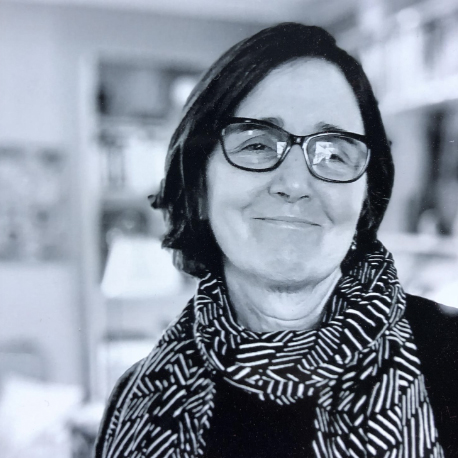 Rebecca Schneider, Professor in the Department of Modern Culture and Media, teaches performance studies, decolonial methods in media and live arts, prehistories of the screen, and theories of intermedia. Engaging with Black Feminist Thought and cognates in Indigenous and postcolonial studies, she is the author of "This Shoal Which is Not One: Island Studies, Performance Studies, and Africans Who Fly" (2020) and the award-winning essay "That the Past May Yet Have Another Future: Gesture in Times of Hand Up" in Theatre Journal. She has essays forthcoming in 2023 and 2024 on Ulrike Rosenback and Vallie Export. She was awarded a Guggenheim Fellowship in 2021.
Rebecca Schneider, Professor in the Department of Modern Culture and Media, teaches performance studies, decolonial methods in media and live arts, prehistories of the screen, and theories of intermedia. Engaging with Black Feminist Thought and cognates in Indigenous and postcolonial studies, she is the author of "This Shoal Which is Not One: Island Studies, Performance Studies, and Africans Who Fly" (2020) and the award-winning essay "That the Past May Yet Have Another Future: Gesture in Times of Hand Up" in Theatre Journal. She has essays forthcoming in 2023 and 2024 on Ulrike Rosenback and Vallie Export. She was awarded a Guggenheim Fellowship in 2021.
Schneider is author of four books: The Explicit Body in Performance (1997); Performing Remains: Art and War in Times of Theatrical Reproduction (Notable Book Award ATHE 2011); Theatre and History (2014): and Remain (with Parikka and Jucan 2018, featuring her long-form essay "Slough Media").
As a consortium editor for TDR: A Journal of Performance Studies, Schneider has edited three special issues on Precarity and Performance (2012), on New Materialisms and Performance (2015), and on Performance and Social Reproduction (2018). Another is in the works on Possession and Automation and another, with madison moore, on queer nightlife. She has published over 50 essays on media and performance in Representations, TDR, Women and Performance, Performance Research as well as in many anthologies, including Psychoanalysis and Performance, Acting Out, Performance and Cultural Politics, Performance Cosmologies, Performance and the City, and her favorite -- the essay "Solo Solo Solo" in After Criticism. She has also coedited the anthologies Futures of Dance Studies and Re:Direction and has collaborated with artists at such sites as the British Museum in London and the Mobile Academy in Berlin, and delivered lectures at the Guggenheim in New York, the Gulbenkian in Lisbon, the Museum of Modern Art in Warsaw, Musee d'art contemporain de Montreal, the Centre de la Dance in Paris, and the Point Art Center in Cyprus as well as at universities around the world. She served as a Distinguished Professor at Queen Mary University of London and a Mercator Fellow in Film Studies at Goethe University in Frankfurt among other affiliations. Her work has been supported by the Mellon Foundation, thw Guggenheim Foundation, and the Cogut and Pembroke Centers at Brown. She is currently working on two projects: a digital book on gesture across mecia to be titled Standing Still Moving, and book on littoral dance in the afterlives of slavery's capitalislm to be titled Shoaling in the Sea of History. Watch a lecture on the project here.
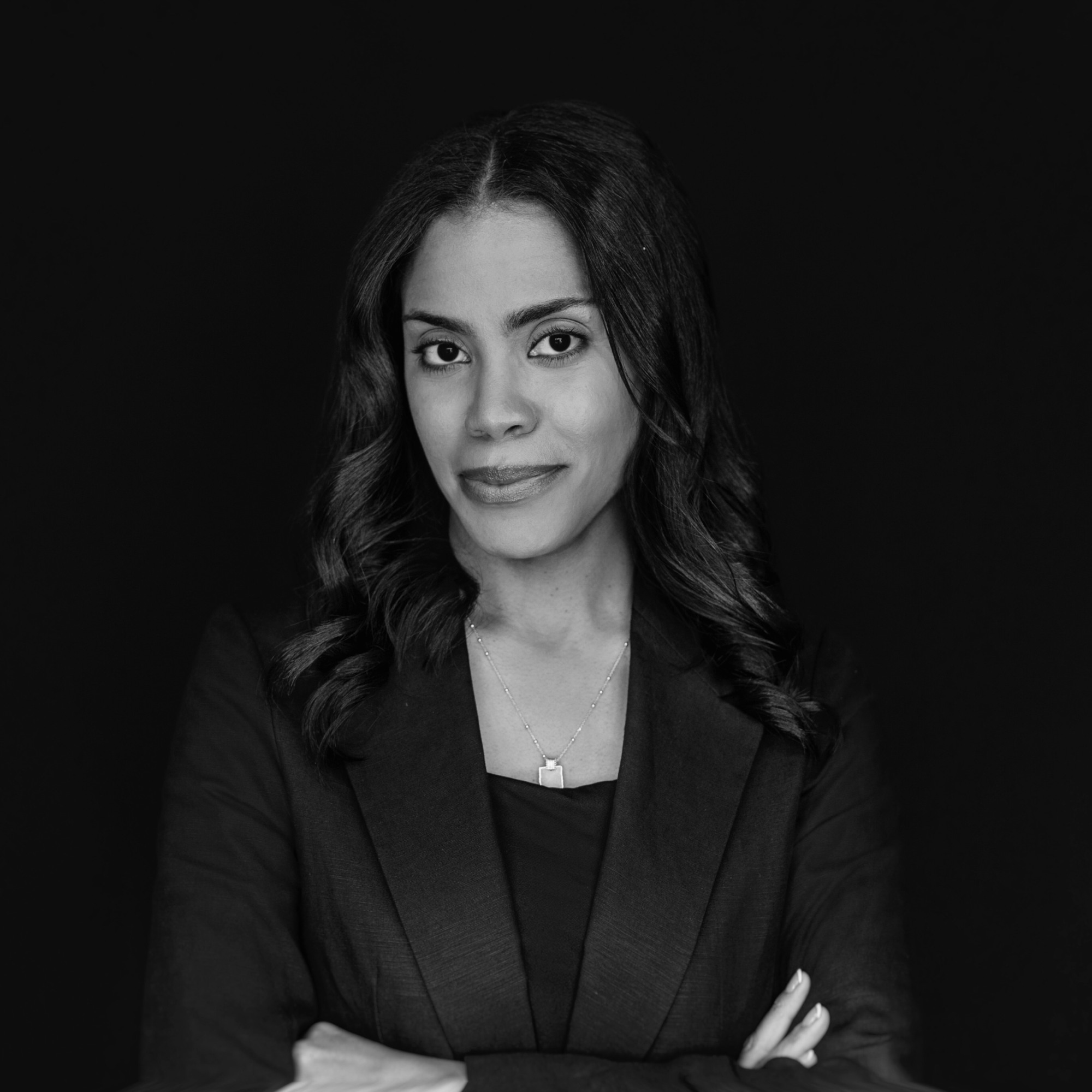 Rizvana Bradley is Associate Professor of Film and Media Studies and Affiliated Faculty in the History of Art and the Center for Race and Gender at the University of California, Berkeley. Bradley’s book, Anteaesthetics: Black Aesthesis and the Critique of Form, was published in 2023 by Stanford University Press in the new series, Inventions: Black Philosophy, Politics, Aesthetics.
Rizvana Bradley is Associate Professor of Film and Media Studies and Affiliated Faculty in the History of Art and the Center for Race and Gender at the University of California, Berkeley. Bradley’s book, Anteaesthetics: Black Aesthesis and the Critique of Form, was published in 2023 by Stanford University Press in the new series, Inventions: Black Philosophy, Politics, Aesthetics.
Bradley's scholarly work has been published in Diacritics, Film Quarterly, Black Camera, Discourse, The Drama Review, Rhizomes, and Women and Performance. Her art criticism has been published in The Yale Review, Artforum, e-flux, Art in America, and Parkett, as well as numerous exhibition catalogs, including for the Serpentine Galleries, the New Museum, Whitechapel Gallery, Leslie-Lohman Museum of Gay and Lesbian Art, Institute of Contemporary Art Philadelphia, and the Berlin Biennale for Contemporary Art.
Bradley has curated a number of academic arts symposia, including events at the British Film Institute, the Serpentine Galleries, and the Stedelijk Museum of Art, and has served as a curatorial advisor for the Yale Center for British Art.
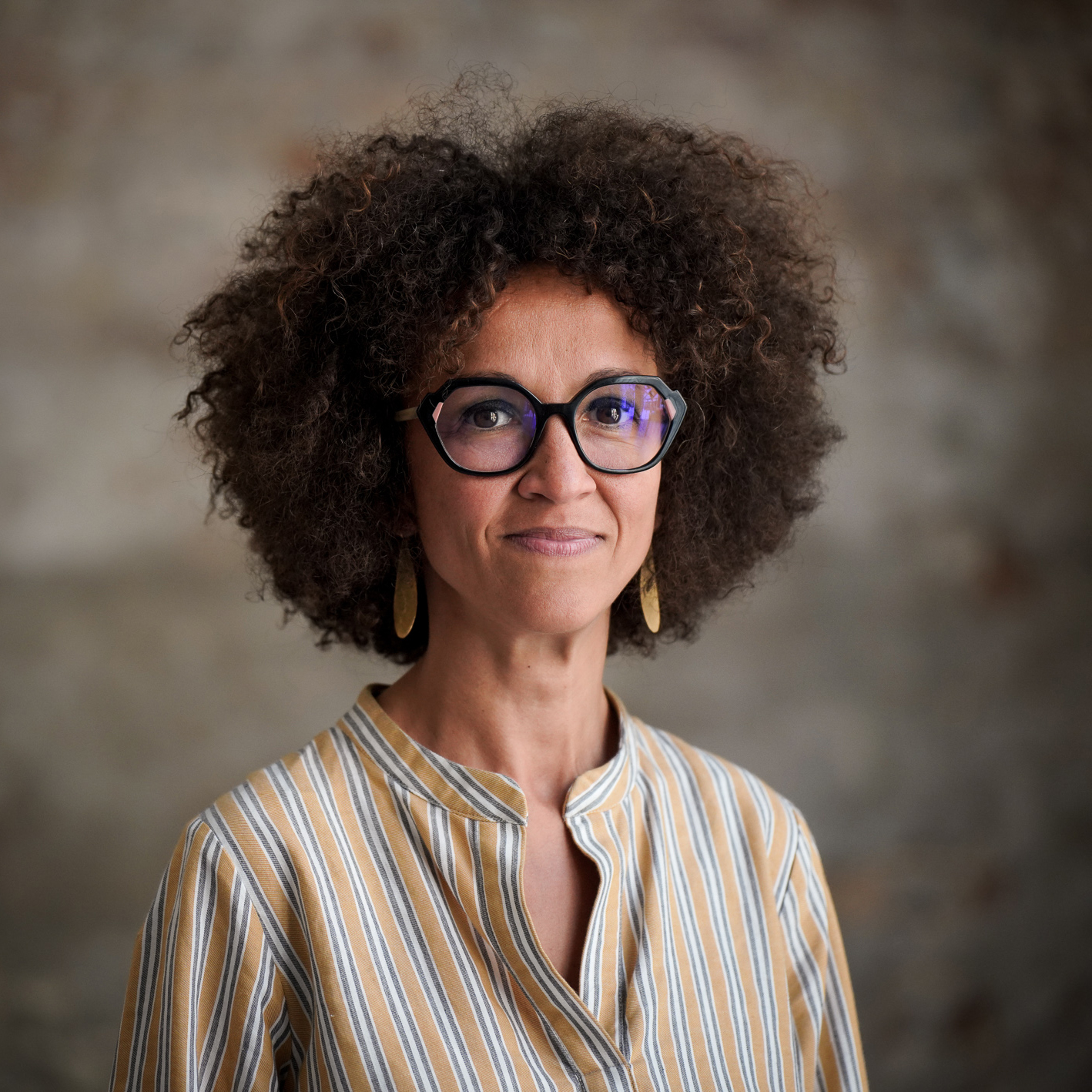 Samia Henni is a historian of the built, destroyed and imagined environments. She is the author of the multi-award-winning Architecture of Counterrevolution: The French Army in Northern Algeria (gta Verlag 2017, 2022, EN; Editions B42, 2019, FR), which received the 2020 Spiro Kostof Book Award from the Society of Architectural Historians, and Colonial Toxicity: Rehearsing French Radioactive Architecture and Landscape in the Sahara (If I Can’t Dance, Framer Framed, edition fink, 2024). She is the editor of Deserts Are Not Empty (Columbia Books on Architecture and the City, 2022) and War Zones (gta Verlag, 2018). She is also the maker of exhibitions, such as Performing Colonial Toxicity (Framer Framed, If I Can’t Dance, Amsterdam; gta Exhibitions, Zurich; The Mosaic Rooms, London, 2023–04), Discreet Violence: Architecture and the French War in Algeria (Zurich, Rotterdam, Berlin, Johannesburg, Paris, Prague, Ithaca, Philadelphia, Charlottesville, 2017–22), Archives: Secret-Défense? (ifa Gallery, SAVVY Contemporary, Berlin, 2021), and Housing Pharmacology (Manifesta 13, Marseille, 2020). She received her PhD in the history and theory of architecture (with distinction, ETH Medal) from ETH Zurich and has taught at Princeton university, ETH Zurich, Geneva University of Art and Design, and Cornell University. Samia was an invited tutor (June–July 2023) at the first-ever Biennale College Architettura 2023 at the 18th International Architecture Exhibition at Venice Architecture Biennale, the inaugural Albert Hirschman Chair (2020–21) at the Institute of Advanced Study in Marseille, a Geddes Fellow (2021) at Edinburgh School of Architecture and Landscape Architecture, a member (2020–23) of the Board of Directors of the Society of Architectural Historians, and a Visiting Professor at the Institute for the History of Art at the University of Zurich (2020) and the Institute for the History and Theory of Architecture (gta), ETH Zurich (2023–24). Currently, she teaches at McGill University’s Peter Guo-hua Fu School of Architecture in Montreal and co-chairs the University Seminar “Beyond France” at Columbia University.
Samia Henni is a historian of the built, destroyed and imagined environments. She is the author of the multi-award-winning Architecture of Counterrevolution: The French Army in Northern Algeria (gta Verlag 2017, 2022, EN; Editions B42, 2019, FR), which received the 2020 Spiro Kostof Book Award from the Society of Architectural Historians, and Colonial Toxicity: Rehearsing French Radioactive Architecture and Landscape in the Sahara (If I Can’t Dance, Framer Framed, edition fink, 2024). She is the editor of Deserts Are Not Empty (Columbia Books on Architecture and the City, 2022) and War Zones (gta Verlag, 2018). She is also the maker of exhibitions, such as Performing Colonial Toxicity (Framer Framed, If I Can’t Dance, Amsterdam; gta Exhibitions, Zurich; The Mosaic Rooms, London, 2023–04), Discreet Violence: Architecture and the French War in Algeria (Zurich, Rotterdam, Berlin, Johannesburg, Paris, Prague, Ithaca, Philadelphia, Charlottesville, 2017–22), Archives: Secret-Défense? (ifa Gallery, SAVVY Contemporary, Berlin, 2021), and Housing Pharmacology (Manifesta 13, Marseille, 2020). She received her PhD in the history and theory of architecture (with distinction, ETH Medal) from ETH Zurich and has taught at Princeton university, ETH Zurich, Geneva University of Art and Design, and Cornell University. Samia was an invited tutor (June–July 2023) at the first-ever Biennale College Architettura 2023 at the 18th International Architecture Exhibition at Venice Architecture Biennale, the inaugural Albert Hirschman Chair (2020–21) at the Institute of Advanced Study in Marseille, a Geddes Fellow (2021) at Edinburgh School of Architecture and Landscape Architecture, a member (2020–23) of the Board of Directors of the Society of Architectural Historians, and a Visiting Professor at the Institute for the History of Art at the University of Zurich (2020) and the Institute for the History and Theory of Architecture (gta), ETH Zurich (2023–24). Currently, she teaches at McGill University’s Peter Guo-hua Fu School of Architecture in Montreal and co-chairs the University Seminar “Beyond France” at Columbia University.
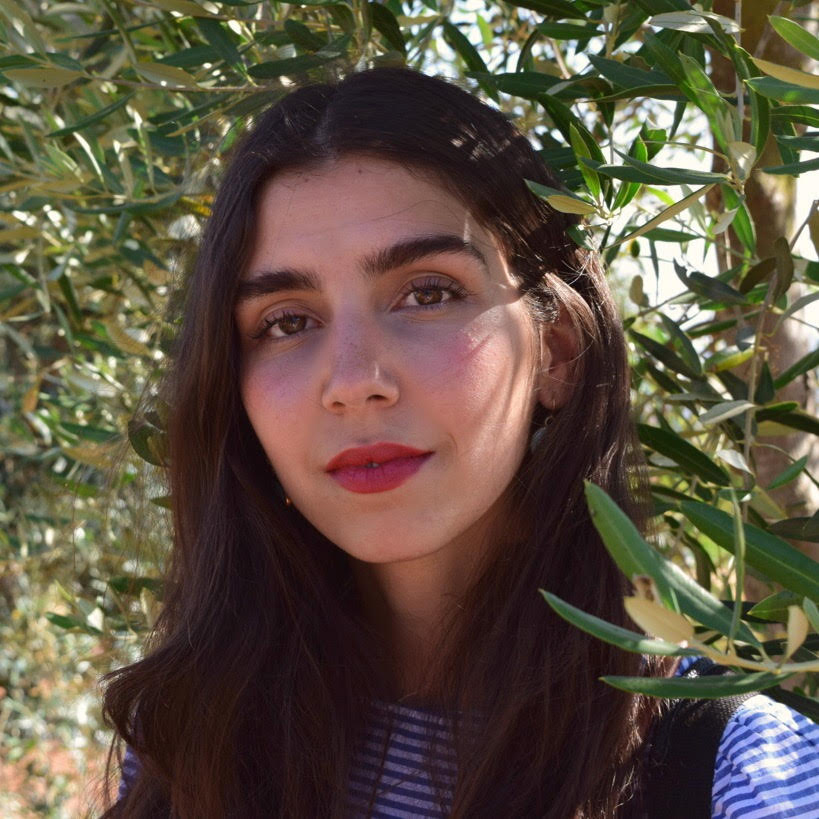 Sherena Razek is a diasporic Palestinian feminist educator, scholar, activist, and labor organizer. At Brown, she is the co-founder and media co-chair of the Palestine Solidarity Caucus of the Graduate Labor Organization and a PhD candidate in the Department of Modern Culture and Media. Her research focuses on Palestinian visual culture, anti-imperial formations, and decolonial feminist ecologies. Her dissertation project “Nakba Ecologies: On Elemental Intifada in Colonized Palestine” offers a grounded intervention in the emergent field of elemental media studies, by tethering the classical elements of water, fire, earth and air to their specific valences in Palestinian film, photography, performance, poetics, and counter archives. Her curatorial work has addressed the politics and aesthetics of surveillance, oceanic degradation, and the militarization and materialization of nation-state borders between the Global North and the Global South. She holds an M.A. in Art History, Visual Art, and Theory from the University of British Columbia (2018) and a B.A. in the History and Theory of Art from the University of Ottawa (2016).
Sherena Razek is a diasporic Palestinian feminist educator, scholar, activist, and labor organizer. At Brown, she is the co-founder and media co-chair of the Palestine Solidarity Caucus of the Graduate Labor Organization and a PhD candidate in the Department of Modern Culture and Media. Her research focuses on Palestinian visual culture, anti-imperial formations, and decolonial feminist ecologies. Her dissertation project “Nakba Ecologies: On Elemental Intifada in Colonized Palestine” offers a grounded intervention in the emergent field of elemental media studies, by tethering the classical elements of water, fire, earth and air to their specific valences in Palestinian film, photography, performance, poetics, and counter archives. Her curatorial work has addressed the politics and aesthetics of surveillance, oceanic degradation, and the militarization and materialization of nation-state borders between the Global North and the Global South. She holds an M.A. in Art History, Visual Art, and Theory from the University of British Columbia (2018) and a B.A. in the History and Theory of Art from the University of Ottawa (2016).
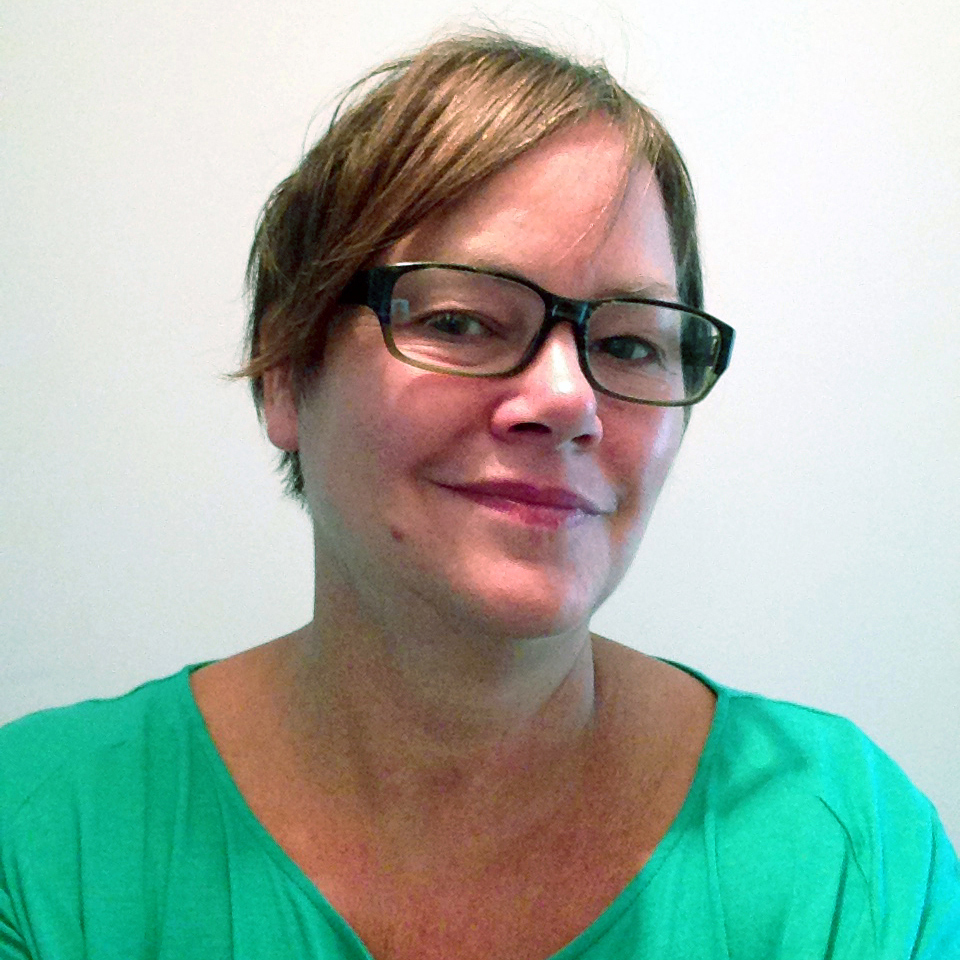 Susan Schuppli is a researcher and artist based in the UK whose work examines material evidence from war and conflict to environmental disasters and climate change. Current work is focused on learning from ice and the politics of cold. Creative projects have been exhibited throughout Europe, Asia, Canada, and the US. She has published widely within the context of media and politics and is author of the book, Material Witness published by MIT Press in 2020. Schuppli is Professor and Director of the Centre for Research Architecture, Goldsmiths University of London where she is also an affiliate artist-researcher and Board Chair of Forensic Architecture.
Susan Schuppli is a researcher and artist based in the UK whose work examines material evidence from war and conflict to environmental disasters and climate change. Current work is focused on learning from ice and the politics of cold. Creative projects have been exhibited throughout Europe, Asia, Canada, and the US. She has published widely within the context of media and politics and is author of the book, Material Witness published by MIT Press in 2020. Schuppli is Professor and Director of the Centre for Research Architecture, Goldsmiths University of London where she is also an affiliate artist-researcher and Board Chair of Forensic Architecture.
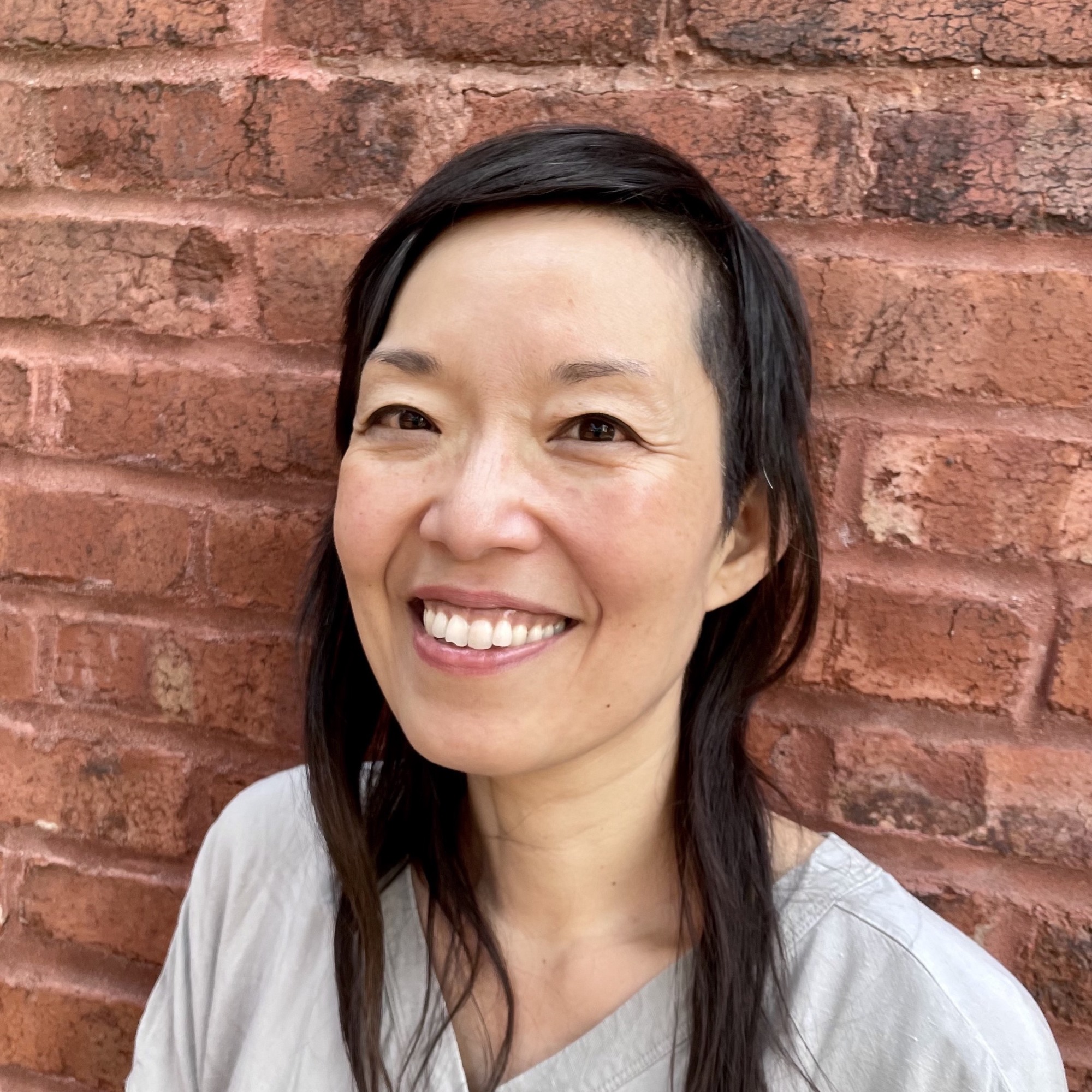 Yuriko Furuhata is Professor and William Dawson Scholar of Cinema and Media History in the Department of East Asian Studies at McGill University. Her first book, Cinema of Actuality: Japanese Avant-Garde Filmmaking in the Season of Image Politics (Duke University Press, 2013), won the Best First Book Award from the Society of Cinema and Media Studies. Her second book, Climatic Media: Transpacific Experiments in Atmospheric Control (Duke University Press, 2022), explores the geopolitical conditions underpinning environmental art, weather control, digital computing, and cybernetic architecture in Japan and the United States. She is currently completing a new book project titled Visual Grammars of Deep Time: Archipelagic Archives of the Anthropocene, which examines sets of scientific atlases, photographs, and films of fossils, clouds, snow crystals, and corals in relation to the settler colonial histories of geosciences in Japan, the Pacific, and North America.
Yuriko Furuhata is Professor and William Dawson Scholar of Cinema and Media History in the Department of East Asian Studies at McGill University. Her first book, Cinema of Actuality: Japanese Avant-Garde Filmmaking in the Season of Image Politics (Duke University Press, 2013), won the Best First Book Award from the Society of Cinema and Media Studies. Her second book, Climatic Media: Transpacific Experiments in Atmospheric Control (Duke University Press, 2022), explores the geopolitical conditions underpinning environmental art, weather control, digital computing, and cybernetic architecture in Japan and the United States. She is currently completing a new book project titled Visual Grammars of Deep Time: Archipelagic Archives of the Anthropocene, which examines sets of scientific atlases, photographs, and films of fossils, clouds, snow crystals, and corals in relation to the settler colonial histories of geosciences in Japan, the Pacific, and North America.
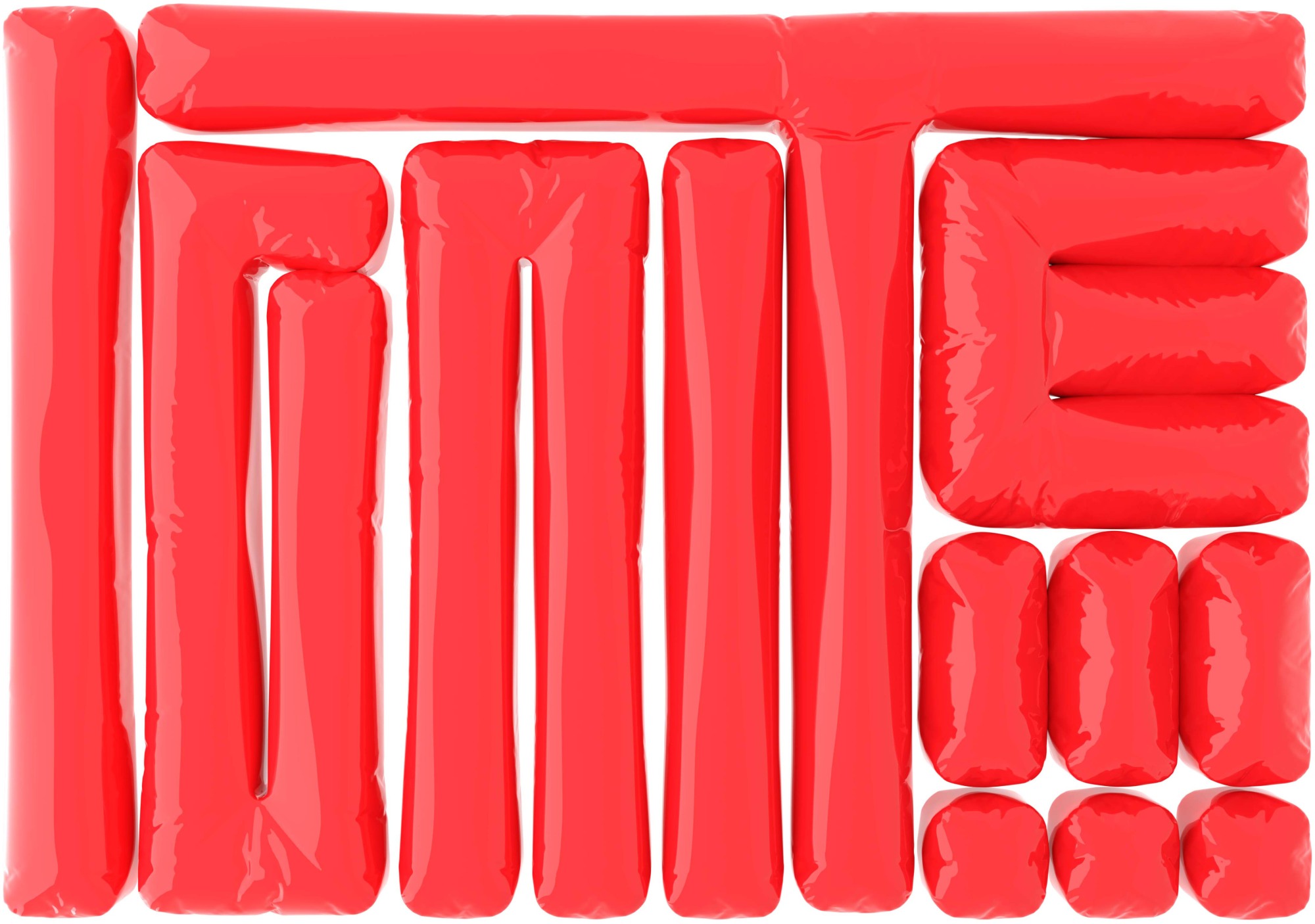
Brown Arts’ IGNITE Series uplifts the spirit of artistic collaboration across Brown, Providence, the Rhode Island region, and beyond. Ignite your creative curiosity through this multi-year series of programs, activations, interventions, and investigations.